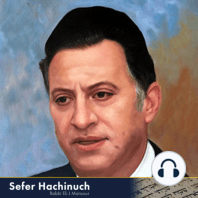20 min listen
Misva #234: Not to Show Special Respect to One Litigant
FromSefer Hachinuch
ratings:
Length:
20 minutes
Released:
Jul 8, 2022
Format:
Podcast episode
Description
The Torah commands in Parashat Kedoshim (Vayikra 19:15), “Ve’lo Tehedar Peneh Gadol,” forbidding a judge from showing special respect to one of the two litigants. If one of the litigants is a prominent, distinguished individual, or comes from a distinguished family, the judge might feel compelled to show that litigant special respect. The Torah forbids showing this litigant respect, and requires treating both litigants equally in the courtroom, regardless of who they are. One example of this law is that a judge may not allow a distinguished litigant to sit, while having the other stand. Rather, both litigants must stand during the court proceedings. The Sefer Ha’hinuch explains that the Shechina is present in a Jewish court, as the verse in Tehillim (82:1) states, “Elokim Nisav Ba’adat Kel” – G-d sits among judges in a Bet Din. Therefore, it is appropriate for the litigants to stand in Bet Din out of respect for the Shechina. Nowadays, however, it is customary for the litigants – as well as the witnesses – to sit, due to the concern that the litigants might not obey the Dayanim (judges) if the Dayanim force them to remain standing during the trial. Nevertheless, the Bah (“Bayit Hadash,” Rav Yoel Sirkes, 1561-1640) writes that it is proper for a G-d-fearing person to stand in court out of respect for the judges and for Hashem. This prohibition applies to judges in all times and in all places. A judge who accords special respect to one of the two litigants transgresses this prohibition as well as the affirmative command of “Be’sedek Tishpot Amitecha” – “You shall judge your fellow justly,” which the Torah presents immediately following the prohibition of “Lo Tehedar Peneh Gadol.” The Sefer Ha’hinuch notes an exception to this law – if one litigant is a Torah scholar and the other is not, then the judge should have the Torah scholar sit, in fulfillment of the obligation to respect Torah scholars. In such a case, the other litigant should be allowed to sit, but is not required to, whereas the judge should insist only that the scholar sit. On the basis of this Halacha, Tosafot in Masechet Sanhedrin (19) question the Gemara’s account of the time when the Jewish king, Yannai, stood trial. The Gemara relates that the judge, Rabbi Shimon Ben Shetah, forced him to stand. Tosafot observe that if a Torah scholar is told to sit in court, then certainly, a king should be told to sit, as well. After all, the honor due to a king exceeds that owed to a Torah scholar, as evidenced by the fact that Halacha allows a Torah scholar to waive the honor owed to him, whereas a king is not entitled to waive the honor to which he is entitled. Seemingly, then, Rabbi Shimon Ben Shetah should not have instructed King Yannai to stand during his trial. Several different answers have been given for this question. One simple answer, suggested by the Tumim (Rav Yehonatan Eibshutz, 1690-1764), is that a king must be given respect only if he acts righteously; a wicked king is not owed respect. King Yannai, who belonged to the heretical Sadducee sect (which denied the authority of the Torah She’be’al Peh), and killed a large number of Torah scholars, was clearly a wicked king. Therefore, he was not owed any respect, and Rabbi Shimon Ben Shetah made him stand during his trial.
Released:
Jul 8, 2022
Format:
Podcast episode
Titles in the series (100)
Misva #8: Leaving Over Meat of the Korban Pesach: Daily Sefer Hachinuch - Brought to you by itorah.com by Sefer Hachinuch
